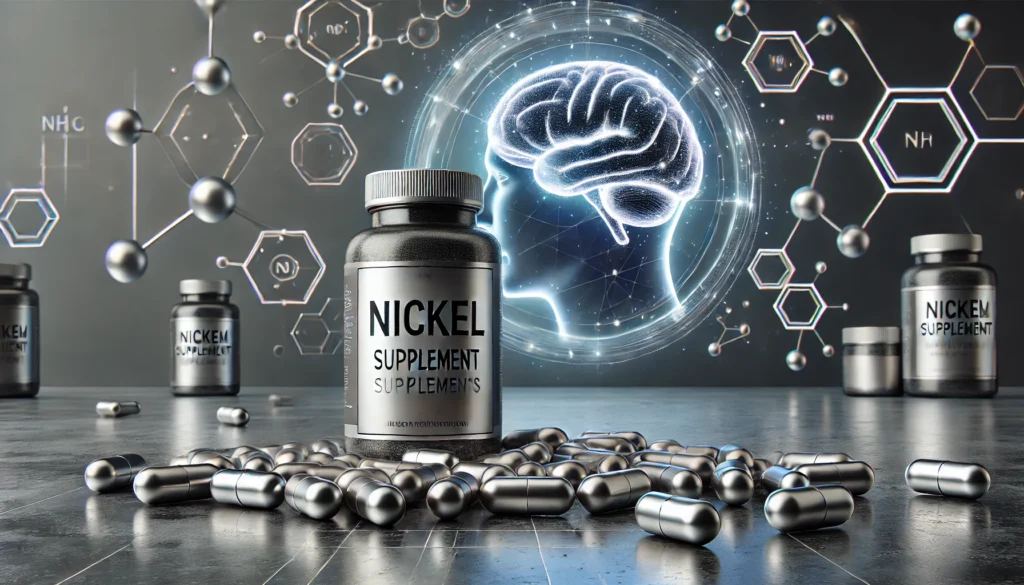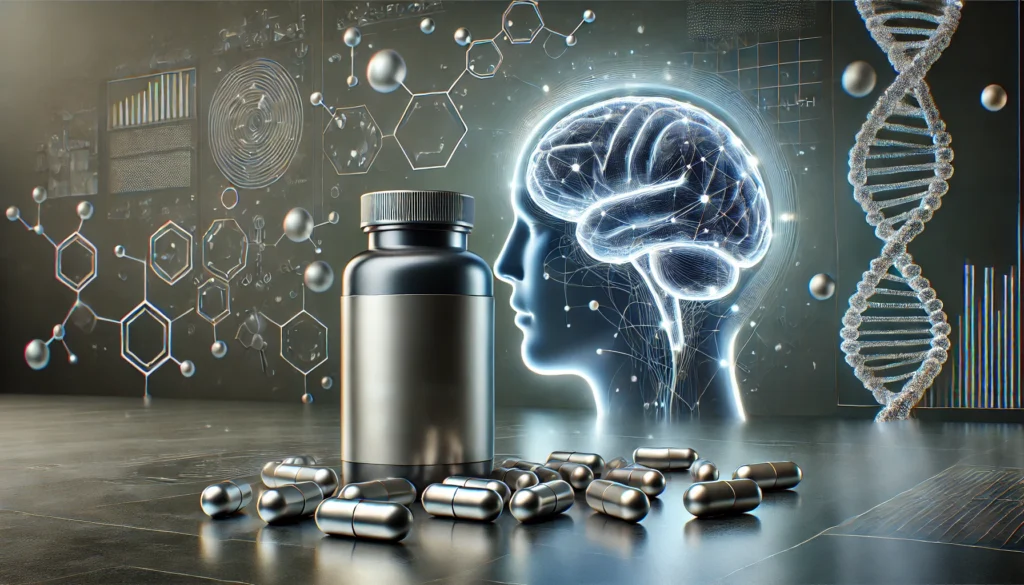Nickel is a trace mineral found naturally in the earth’s crust, soil, and even within the human body. While often associated with industrial applications, nickel also plays a role in human health and metabolism. Emerging research has shown that nickel, when consumed at very low levels, may have nootropic potential—that is, the capacity to enhance cognitive function. This article examines the science behind nickel as a nootropic supplement, exploring its biochemical roles, potential cognitive benefits, safe dosage guidelines, side effects, and interactions with other supplements or medications. Given the complexity of nickel’s role in health, it is essential to approach supplementation with careful consideration.
You May Also Like:
Theaflavin: Benefits, Dosage, Side Effects, Drug Interactions, and Other Important Information
TIQ: Benefits, Dosage, Side Effects, Drug Interactions, and Other Important Information
Sources of Nickel
Nickel is naturally present in both plant and animal foods, as well as in water and air. The mineral is typically consumed in small amounts through dietary sources, including nuts, seeds, grains, legumes, and certain leafy greens. Nickel is also present in fish and seafood, although it is more abundant in plant-based foods. The following are common dietary sources of nickel:
- Plant-based foods: Beans, nuts (especially almonds and hazelnuts), oats, and whole grains provide notable amounts of nickel.
- Animal-based foods: Seafood like shellfish, as well as certain types of fish, contain lower but notable amounts of nickel.
- Drinking water: Groundwater or well water can have trace amounts of nickel, depending on the region.
Most people meet their daily nickel intake through food and water, typically around 20-50 micrograms per day. However, the concentration of nickel in the diet can vary due to soil composition, agricultural practices, and food processing methods.
L-Theanine supports mental clarity and helps maintain a balanced mood—Buy Now on Amazon!

Chemistry and Biological Role of Nickel
Nickel’s biological function in humans, while not entirely understood, is thought to involve its role in certain enzymes and cellular processes. Nickel atoms can act as cofactors, helping to catalyze or support reactions within enzymes. Nickel’s essential biochemical role, although not fully detailed, is likely linked to stabilizing protein structures and supporting enzymatic reactions in cell membranes.
In trace amounts, nickel is required by certain proteins and enzymes, such as urease (involved in nitrogen metabolism) and superoxide dismutase (an antioxidant enzyme). These enzymes help protect cells from oxidative stress, and nickel may enhance their stability and function. Additionally, nickel may influence iron absorption and metabolism, further supporting cellular health. However, in excess, nickel can disrupt cellular balance, potentially leading to toxicity.
Physiological Mechanisms of Nickel in the Body and Brain
Nickel’s action in the body is closely tied to its role as a cofactor in enzyme activity and protein structure. Nickel’s antioxidant properties support cellular protection by enhancing the activity of enzymes that neutralize reactive oxygen species (ROS). By stabilizing proteins that contribute to cellular energy production and defense, nickel may indirectly benefit brain health, aiding in mental clarity and focus.
Recent research suggests that nickel may play a subtle but supportive role in cognitive function through several mechanisms:
- Cellular Stability and Antioxidant Defense: Nickel’s function in certain antioxidant enzymes helps minimize oxidative stress, which can otherwise damage brain cells and impair cognitive processes.
- Mitochondrial Health and Energy Production: Although limited, studies indicate that nickel supports mitochondrial function, which is crucial for cellular energy production in high-energy organs like the brain.
- Neurotransmitter Modulation: While speculative, nickel may play a role in neurotransmitter synthesis due to its involvement in certain enzymatic reactions. This could have implications for cognitive processing, mood regulation, and mental clarity.

Potential Nootropic Benefits of Nickel
Nickel’s potential as a nootropic supplement is still under investigation, but some emerging evidence suggests benefits that may contribute to cognitive function and mental health:
- Enhanced Cognitive Resilience: Nickel’s role in cellular defense against oxidative stress could protect neurons from damage, potentially supporting long-term brain health and resilience against age-related cognitive decline. This protective effect may help reduce the impact of environmental stressors on the brain, potentially lowering the risk of neurodegenerative diseases. By stabilizing cellular structures, nickel could also support faster recovery from mental fatigue and stress.
- Improved Focus and Mental Energy: By supporting enzymatic reactions that produce cellular energy, nickel may indirectly contribute to sustained mental energy and focus. This is particularly valuable during mentally demanding tasks or periods of mental fatigue, as it may aid in maintaining alertness and cognitive sharpness. Additionally, nickel’s support of mitochondrial function may contribute to more consistent energy availability within brain cells, helping sustain peak mental performance.
- Mood Regulation: Nickel’s involvement in enzyme stabilization may influence neurotransmitter pathways, potentially aiding mood stabilization and emotional well-being. While not a primary treatment for mood disorders, balanced nickel intake could support overall mental wellness by helping regulate stress responses. In combination with other nutrients, nickel may contribute to a balanced mood and lower instances of mood fluctuations.
It is important to note that while the nootropic benefits of nickel are promising, they are still largely theoretical. Further research is needed to confirm nickel’s efficacy as a nootropic agent.

Dosage and Supplementation Guidelines
Given nickel’s role as a trace mineral, even small amounts are sufficient to support its biological functions. For most adults, a daily intake of 20-50 micrograms is typically adequate and is usually met through diet. However, for individuals considering nickel supplementation, the following guidelines may apply:
- General Dosage for Cognitive Support: To support cognitive function, doses of 25-50 micrograms per day are typically recommended, as higher intakes can increase the risk of toxicity. Supplements generally range from 10-50 micrograms, as this amount is considered safe for most individuals.
- Dietary Sources as Primary Intake: Obtaining nickel from natural sources like nuts, grains, and vegetables is preferred over supplementation due to the lower risk of toxicity and the presence of additional nutrients that support nickel’s action.
- Supplement Forms: Nickel is available in supplement form, typically as nickel sulfate or nickel chloride. Nickel supplements are uncommon and should be approached with caution, as exceeding the recommended intake can lead to toxicity.
Since nickel is a trace mineral, the risk of deficiency is low, and supplementation should only be considered under the guidance of a healthcare provider.
Side Effects and Safety
Nickel is generally safe in small amounts, but higher doses or prolonged exposure can lead to adverse health effects. Some common side effects and risks associated with nickel supplementation include:
- Gastrointestinal Issues: High doses of nickel may cause nausea, diarrhea, and abdominal discomfort, particularly in individuals with nickel sensitivity.
- Allergic Reactions: Nickel is a common allergen, with nickel sensitivity often presenting as contact dermatitis. Ingested nickel can cause systemic reactions in sensitive individuals, leading to skin rashes, itching, or swelling.
- Kidney and Liver Toxicity: Excessive nickel intake can strain the kidneys and liver, which are responsible for excreting the mineral. Prolonged high intake of nickel may exacerbate these organs and contribute to toxicity.
To minimize these risks, individuals should aim to meet nickel needs primarily through dietary sources rather than supplements, unless advised otherwise by a healthcare professional.

Interactions with Other Supplements and Medications
Nickel can interact with various medications and supplements, potentially affecting their efficacy or causing adverse reactions. Some important interactions to consider include:
- Iron Supplements: Nickel and iron share similar absorption pathways, so excessive iron intake can compete with nickel absorption, leading to decreased nickel availability. Individuals with high iron intake should monitor their nickel levels.
- Vitamin C: High doses of vitamin C may increase the excretion of nickel, potentially reducing its effectiveness as a nootropic. Individuals supplementing with vitamin C should ensure adequate dietary nickel intake to offset potential losses.
- Antibiotics: Certain antibiotics, such as tetracyclines, may interfere with nickel absorption, reducing the mineral’s bioavailability. In these cases, it may be advisable to separate nickel supplementation from antibiotic doses.
- Antacids and Proton Pump Inhibitors: These medications, commonly used to treat acid reflux, can alter stomach acidity and interfere with nickel absorption. For individuals on long-term acid suppression therapy, maintaining adequate nickel levels may require dietary adjustments.
Risks for Individuals with Certain Health Conditions
While nickel is safe for most individuals, some health conditions may require caution with nickel intake:
- Nickel Sensitivity or Allergy: Individuals with known nickel allergies should avoid nickel supplements, as even small amounts can trigger systemic allergic reactions. Symptoms include skin rashes, itching, and, in severe cases, respiratory issues.
- Kidney Disease: Due to its role in nickel excretion, the kidneys can become overwhelmed by excessive nickel intake. Individuals with impaired kidney function should limit nickel intake to prevent potential toxicity.
- Liver Disease: Nickel is metabolized in the liver, and those with liver disease may experience altered nickel metabolism. In such cases, high nickel intake may increase the risk of liver strain or toxicity.
Conclusion: Should You Consider Nickel as a Nootropic?
Nickel’s roles in cellular stability, antioxidant defense, and enzyme support make it an intriguing candidate for cognitive enhancement. While dietary intake is typically sufficient for meeting the body’s nickel needs, trace supplementation could provide benefits in cognitive resilience, mental clarity, and mood stability. However, it is essential to approach nickel supplementation with caution, given the risks of toxicity and potential side effects.
As with any supplement, individuals should consult a healthcare provider before considering nickel supplementation, particularly if they have pre-existing health conditions or are taking medications that may interact with this mineral. Further research will be critical in determining nickel’s full potential as a nootropic agent. In the meantime, maintaining a balanced diet with adequate nickel intake is a safe and effective way to support overall brain health.

References:
- Nickel, an essential trace element. Metabolic, clinical and therapeutic considerations. Retrieved from: https://pubmed.ncbi.nlm.nih.gov/1834408/
- Nickel – role in human organism and toxic effects. Retrieved from: https://pubmed.ncbi.nlm.nih.gov/27591452/
- Nickel impact on human health: An intrinsic disorder perspective. Retrieved from: https://www.sciencedirect.com/science/article/abs/pii/S157096391630190X
Important Note: The information contained in this article is for general informational purposes only, and should not be construed as health or medical advice, nor is it intended to diagnose, prevent, treat, or cure any disease or health condition. Before embarking on any diet, fitness regimen, or program of nutritional supplementation, it is advisable to consult your healthcare professional in order to determine its safety and probable efficacy in terms of your individual state of health.
Regarding Nutritional Supplements Or Other Non-Prescription Health Products: If any nutritional supplements or other non-prescription health products are mentioned in the foregoing article, any claims or statements made about them have not been evaluated by the U.S. Food and Drug Administration, and such nutritional supplements or other health products are not intended to diagnose, treat, cure, or prevent any disease.


